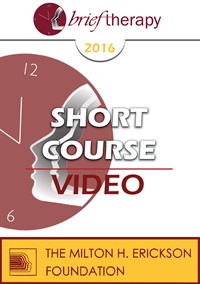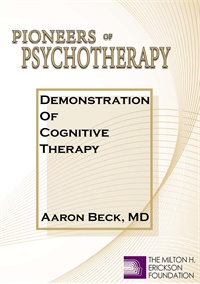
Credit available - Click Here for more information
- Average Rating:
- Not yet rated
- Topic Areas:
- Clinical Demonstrations | Abuse | Addiction | Psychotherapy | Role Play | Cognitive Behavior Therapy (CBT) | Relationships
- Bundle(s):
- Pioneers of Psychotherapy Bundle
- Categories:
- Pioneers of Psychotherapy | Online Continuing Education | Evolution of Psychotherapy | Evolution of Psychotherapy 1995
- Faculty:
- Aaron Beck, MD
- Course Levels:
- Master Degree or Higher in Health-Related Field
- Duration:
- 00:59:00
- Format:
- Audio and Video
- Original Program Date:
- Dec 15, 1995
- Short Description:
- Aaron Beck (1995) selects a clinician to role-play a male client. The client, Mike, was abandoned by his wife after she had multiple affairs. Mike is a recovering alcoholic with a sexually transmitted disease who suffers from dating anxiety, childhood trauma, and feelings of inferiority. Beck demonstrates how to establish a collaborative relationship with the patient.
- Price:
- $59.00 - Base Price
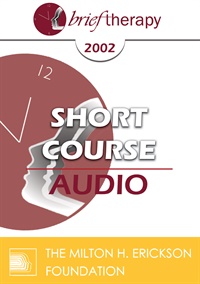
- Average Rating:
- Not yet rated
- Topic Areas:
- Short Courses | Addiction | Brief Therapy | Ericksonian Hypnosis and Therapy Techniques
- Categories:
- Brief Therapy Conference | Brief Therapy Conference 2002
- Faculty:
- Albina Tamalonis, PsyD
- Duration:
- 1:19:14
- Format:
- Audio Only
- Original Program Date:
- Dec 12, 2002
- Short Description:
- This course offers a practical step-by-step approach to overcoming vicious circles and addictions. The foundation of this comprehensive treatment is based on learning research and Ericksonian ideas. For example, what is learned can be unlearned and helping your patient target small changes eventually progresses into lasting change. An addiction effects all the areas of a patient's life; mental, emotional, physical, spiritual, behavioral and social. Six Ericksonian hypnotic protocols are given to help you help your patient create changes in these six areas.
- Price:
- $15.00 - Base Price
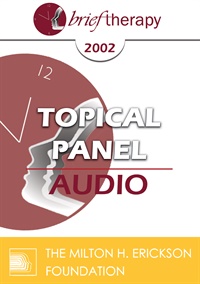
- Average Rating:
- Not yet rated
- Topic Areas:
- Topical Panels | Addiction | Brief Therapy
- Categories:
- Brief Therapy Conference | Brief Therapy Conference 2002
- Faculty:
- Steve De Shazer, MSSW | Robert Dilts, BA | Arthur Freeman, EdD
- Duration:
- 59:39
- Format:
- Audio Only
- Original Program Date:
- Dec 13, 2002
- Short Description:
- To describe the use of brief therapy techniques in specific clinical situations.
- Price:
- $15.00 - Base Price
Tags: Addiction Brief Therapy
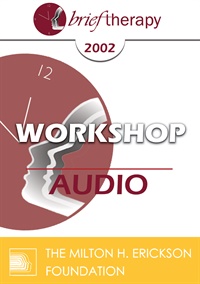
- Average Rating:
- Not yet rated
- Topic Areas:
- Workshops | Habits | Addiction | Brief Therapy | Ericksonian Hypnosis and Therapy Techniques | Tailoring
- Categories:
- Brief Therapy Conference | Brief Therapy Conference 2002
- Faculty:
- Jeffrey Zeig, PhD
- Duration:
- 2:31:23
- Format:
- Audio Only
- Original Program Date:
- Dec 14, 2002
- Short Description:
- A method will be presented for joining strategic assessment and intervention to create pattern disruption and elicit resources for change. Essentials of an Ericksonian method for tailoring approaches to habit control will be offered. Weight and smoking control will be emphasized.
- Price:
- $15.00 - Base Price
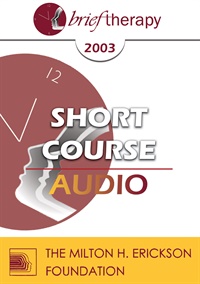
- Average Rating:
- Not yet rated
- Topic Areas:
- Short Courses | Addiction | Brief Therapy | Psychotherapy | Abuse | Motivation | Personality Disorders
- Categories:
- Brief Therapy Conference | Brief Therapy Conference 2003
- Faculty:
- Ralph Armstrong, MD
- Duration:
- 1:37:13
- Format:
- Audio Only
- Original Program Date:
- Dec 13, 2003
- Short Description:
- Motivation is crucial to successful recovery from Substance Use Disorders. Fifteen DSM IV conditions reduce the motivation needed to bond with programs that assist in abstinence. Child abuse and neglect are frequent in substance abusers, and a conceptualization of its role in substance abuse is given. Therapy for sequelae such as schizoid personality, resentment, pessimism and others are described. with treatment of Axis I and II disorders accomplished, and the effects of abuse/neglect allayed, involvement with 12 step programs is more likely.
- Price:
- $15.00 - Base Price
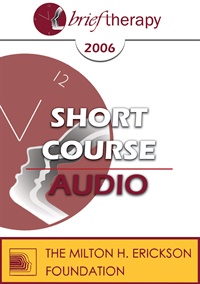
- Average Rating:
- Not yet rated
- Topic Areas:
- Short Courses | Addiction | Brief Therapy | Communication | Mind-Body | Utilization
- Categories:
- Brief Therapy Conference | Brief Therapy Conference 2006
- Faculty:
- Bart Walsh, MSW
- Duration:
- 1:19:30
- Format:
- Audio Only
- Original Program Date:
- Dec 07, 2006
- Short Description:
- This presentation poses a brief substance abuse treatment which acknowledges and accommodates the personal needs being addressed by substance use, bypasses perceived resistance and employs the essence of idiosyncratic psychobiological learning to achieve a body-mind gestalt complementary to the client's sobriety. Client self-empowerment and relapse prevention are built into the intervention. This method develops a safe framework for addressing any subsequent mental health themes directly or indirectly related to substance misuse. A particular form of body language known as ideomotor signaling is established in this procedure.
- Price:
- $15.00 - Base Price
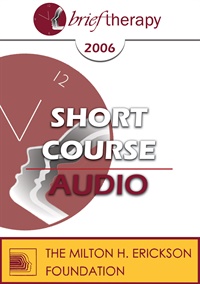
- Average Rating:
- Not yet rated
- Topic Areas:
- Short Courses | Addiction | Brief Therapy
- Categories:
- Brief Therapy Conference | Brief Therapy Conference 2006
- Faculty:
- Michele Packard, PhD
- Duration:
- 1:18:42
- Format:
- Audio Only
- Original Program Date:
- Dec 07, 2006
- Short Description:
- In spite of concentrated efforts by federal agencies to remedy deficits outlined in the 1991 Institute of Medicine report on the state of substance abuse treatment in the US, and in spite of the fact that the best quality psychotherapy outcome and process studies have been conducted by addictions researchers, the field continues to be unable to implement its own Best Practices. This presentation will provide participants with a research-based menu of brief interventions that can be applied in a variety of settings.
- Price:
- $15.00 - Base Price
Tags: Addiction Brief Therapy
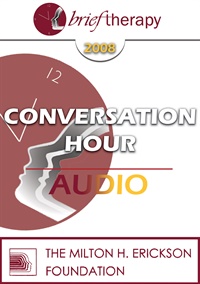
- Average Rating:
- Not yet rated
- Topic Areas:
- Conversation Hours | Addiction | Brief Therapy
- Categories:
- Brief Therapy Conference | Brief Therapy Conference 2008
- Faculty:
- Jon Carlson
- Duration:
- 52:05
- Format:
- Audio Only
- Original Program Date:
- Dec 13, 2008
- Short Description:
- BT08 Conversation Hour 03 - Relapse Prevention - Jon Carlson, PsyD, EdD
- Price:
- $15.00 - Base Price
Tags: Addiction Brief Therapy
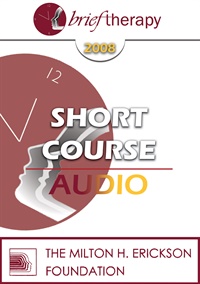
- Average Rating:
- Not yet rated
- Topic Areas:
- Short Courses | Addiction | Brief Therapy | Communication | Mind-Body | Utilization
- Categories:
- Brief Therapy Conference | Brief Therapy Conference 2008
- Faculty:
- Bart Walsh, MSW
- Duration:
- 1:24:25
- Format:
- Audio Only
- Original Program Date:
- Dec 11, 2008
- Short Description:
- This presentation poses a substance abuse treatment which acknowledges and accommodates the personal needs being addressed by substance use, bypasses perceived resistance and employs idiosyncratic psycho-biological learning to achieve a body-mind Gestalt complementary to the client's sobriety. Client self-empowerment and relapse prevention are built into the intervention. This method develops a safe framework for addressing any subsequent mental health themes directly or indirectly related to substance misuse. A simple form of bodymind communication, known as ideomotor questioning, is employed in this procedure. Because this is a new strategy, fundamental information applicable to all levels of professional experience, will be provided.
- Price:
- $15.00 - Base Price
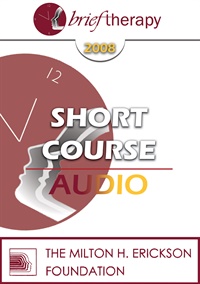
- Average Rating:
- Not yet rated
- Topic Areas:
- Short Courses | Addiction | Brief Therapy | Habits | Mind-Body | Mindfulness
- Categories:
- Brief Therapy Conference | Brief Therapy Conference 2008
- Faculty:
- Mary Augustyn, MS
- Duration:
- 1:16:00
- Format:
- Audio Only
- Original Program Date:
- Dec 11, 2008
- Short Description:
- Stop-Breathe-Focus (SBF) diffuses volatile situations, interrupts addictive/compulsive behaviors, resolves conflicts, facilitates healthy decisions and changes problematic behavior. SBF is useful to make changes quickly, to autopsy previous behaviors and to create a plan for behavior change; all in a simple, easy-to-use package.
- Price:
- $15.00 - Base Price
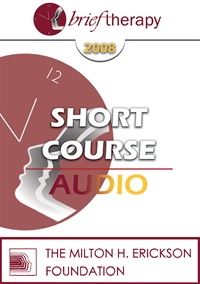
- Average Rating:
- Not yet rated
- Topic Areas:
- Short Courses | Addiction | Hypnosis | Trance | Trauma | Brief Therapy | Dissociation
- Categories:
- Brief Therapy Conference | Brief Therapy Conference 2008
- Faculty:
- Albina Tamalonis, PsyD
- Duration:
- 1:31:45
- Format:
- Audio Only
- Original Program Date:
- Dec 11, 2008
- Short Description:
- People who are traumatized, and/or have one of the multitudes of addictive disorders are, in great part, dissociated from their physical reality. There is research which indicates that people who exercise are more likely to suffer from less anxiety, pain and depression. This short course offers a practical approach to overcoming people's reluctance to exercise by using active-alert hypnosis and music. By listening to hypnosis with music while exercising, people can alter their perceptions of pain, time, effort and pleasure. The words of the hypnosis are taken from the works of Milton H. Erickson, Jeffrey Zeig, Michael Yapko and Eva Banyai. Their different contributions will be delineated and explained.
- Price:
- $15.00 - Base Price

- Average Rating:
- Not yet rated
- Topic Areas:
- Short Courses | Habits | Addiction | Ericksonian Hypnosis and Therapy Techniques | Brief Therapy
- Categories:
- Brief Therapy Conference | Brief Therapy Conference 2008
- Faculty:
- Joseph Dowling, MS, LPC
- Duration:
- 1:31:47
- Format:
- Audio Only
- Original Program Date:
- Dec 11, 2008
- Short Description:
- This short course will emphasize a four session smoking cessation model that will provide attendees with an Ericksonian template to be utilized in the treatment of smoking, weight loss, nail-biting, obsessive thinking, compulsive behavior and addictive behavior. An Ericksonian template for habit control can be formulated to the unique symptomology and strengths of each individual client. There will be a detailed discussion of the four session smoking cessation model with case studies, experiential exercises and a live demonstration.
- Price:
- $15.00 - Base Price
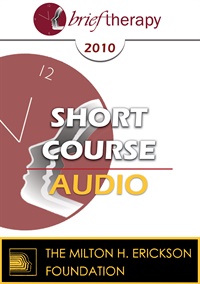
- Average Rating:
- Not yet rated
- Topic Areas:
- Addiction | Short Courses | Brief Therapy | Communication | Mind-Body | Utilization
- Categories:
- Brief Therapy Conference | Brief Therapy Conference 2010
- Faculty:
- Bart Walsh, MSW
- Duration:
- 1:32:27
- Format:
- Audio Only
- Original Program Date:
- Dec 09, 2010
- Short Description:
- This presentation poses a substance abuse treatment which acknowledges and accommodates the personal needs being addressed by substance use, bypasses perceived resistance and employs idiosyncratic psycho-biological learning to achieve a mind-body gestalt complementary to the client’s sobriety. Client self-empowerment and relapse prevention are built into the intervention. This method develops a safe framework for addressing any subsequent mental health themes directly or indirectly related to substance misuse. A simple form of mind-body communication known as ideomotor questioning is employed in this procedure. Because this is a new strategy, fundamental information applicable to all levels of professional experience will be provided.
- Price:
- $15.00 - Base Price
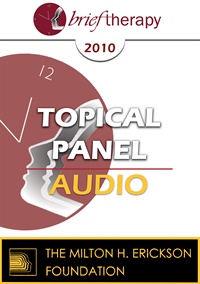
- Average Rating:
- Not yet rated
- Topic Areas:
- Addiction | Topical Panels | Behavioral Psychology | Behavioral Therapy | Identity
- Categories:
- Brief Therapy Conference | Brief Therapy Conference 2010
- Faculty:
- Frank Dattilio, PhD, ABPP | Esther Perel, MA, LMFT | Reid Wilson, PhD
- Duration:
- 59:06
- Format:
- Audio Only
- Original Program Date:
- Dec 11, 2010
- Short Description:
- This panel explores the complex link between anxiety disorders and addiction, with data showing high overlap across conditions like PTSD, GAD, and alcoholism. Reid Wilson stresses the need for simultaneous treatment of both issues. Topics include sexual addiction, cultural influences, and the critical role of family dynamics in recovery. Emphasis is placed on personalized, flexible approaches that reflect the diverse nature of addictive behaviors.
- Price:
- $15.00 - Base Price
- Average Rating:
- Not yet rated
- Topic Areas:
- Keynotes | Addiction
- Categories:
- Brief Therapy Conference | Brief Therapy Conference 2012
- Faculty:
- Patrick Carnes, PhD, CAS
- Course Levels:
- Master Degree or Higher in Health-Related Field
- Duration:
- 1:07:07
- Format:
- Audio and Video
- Original Program Date:
- Dec 08, 2012
- Short Description:
- BT12 Keynote 04 – Bargains with Chaos: Challenges and Choices – Patrick Carnes, PhD, CAS We witness a continuous parade of stars, financial gurus, clergy, politicians and athletes who enter rehabs sometimes repetitively. Is this about media coverage or are these elite canaries in the coal mines of our culture signifying a greater danger? Our understanding of addictions with the aid of neuroscience is expanding dramatically. With it is the realization of cultural and scientific shifts which underline the therapist’s role in facing our number one public health problem. One of the gifts of this challenge is our growth in technology which will transform what every therapist does for a living and maybe how humans evolve. But maybe we professionals are like the famous—reluctant to face difficult realities.
- Price:
- $29.00 - Base Price
Tags: Addiction Neuroscience

- Average Rating:
- Not yet rated
- Topic Areas:
- Addiction | Workshops | Pain and Healing
- Categories:
- Brief Therapy Conference | Brief Therapy Conference 2012
- Faculty:
- Roxanna Erickson Klein, RN, PhD, LPC, LCDC | Mary Ellen Bluntzer
- Duration:
- 2:45:07
- Format:
- Audio Only
- Original Program Date:
- Dec 06, 2012
- Short Description:
- Chronic pain and substance dependency often collide in ways that overwhelm both patients and providers. In this integrative workshop, the presenters bridge medicine and Ericksonian hypnosis to reframe pain as mutable rather than fixed. Through demonstration, case examples, and practical hypnotic strategies, they show how endogenous skills such as dissociation, time distortion, and sensory transformation can reduce suffering while supporting responsible pain management in high-risk populations.
- Price:
- $15.00 - Base Price
- Average Rating:
- Not yet rated
- Topic Areas:
- Addiction | Short Courses | Utilization | Mind-Body
- Categories:
- Brief Therapy Conference | Brief Therapy Conference 2016
- Faculty:
- Bart Walsh, MSW
- Course Levels:
- Master Degree or Higher in Health-Related Field
- Duration:
- 1:30:02
- Format:
- Audio and Video
- Original Program Date:
- Dec 08, 2016
- Short Description:
- This presentation poses a substance abuse treatment which acknowledges and accommodates the personal needs being addressed by substance use, bypasses perceived resistance and employs idiosyncratic psycho-biological learning to achieve a body-mind gestalt complementary to the client’s sobriety. Client self empowerment and relapse prevention are built into the intervention This method develops a safe framework for addressing any subsequent mental health themes directly or indirectly related to substance misuse. Ideomotor questioning is employed as a practical conduit to body-mind communication and function.
- Price:
- $0.00 - $29.00
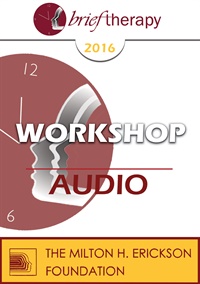
- Average Rating:
- Not yet rated
- Topic Areas:
- Psychotherapy | Workshops | Generative Psychotherapy | Addiction | Anxiety | Depression | Trauma
- Categories:
- Brief Therapy Conference | Brief Therapy Conference 2016
- Faculty:
- Stephen Gilligan, PhD
- Duration:
- 2:36:56
- Format:
- Audio Only
- Original Program Date:
- Dec 09, 2016
- Short Description:
- This workshop presents the Generative Psychotherapy approach to human states of suffering--depression, anxiety, trauma, addiction, etc. This practical and positive approach assumes that each core human experience has equivalent potential to be positive or negative, depending on the human relationship to it; and thus focuses on how problems may be transformed to resources by skillful human connection.
- Price:
- $15.00 - Base Price
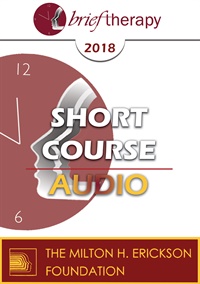
- Average Rating:
- Not yet rated
- Topic Areas:
- Short Courses | Addiction | Brief Therapy | Rational Emotive Behavior Therapy (REBT) | Solution Oriented Approach
- Categories:
- Brief Therapy Conference | Brief Therapy Conference 2018
- Faculty:
- JULIA ALPEROVICH, MS
- Duration:
- 1:25:51
- Format:
- Audio Only
- Original Program Date:
- Dec 06, 2018
- Short Description:
- This presentation will introduce a short-term model of treatment incorporating solution-focused, rational emotive behavioral, and systems theory interventions for residential or intensive outpatient drug and alcohol treatment.
- Price:
- $15.00 - Base Price
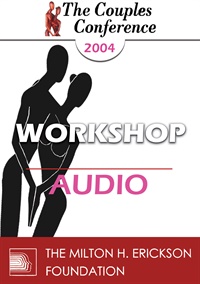
- Average Rating:
- Not yet rated
- Topic Areas:
- Workshops | Love | Avoidant | Addiction
- Categories:
- Couples Conference | Couples Conference 2004 | Pioneers in Couples and Family Therapy
- Faculty:
- Terry Real, LICSW
- Duration:
- 1:48:39
- Format:
- Audio Only
- Original Program Date:
- Mar 27, 2004
- Short Description:
- This workshop examines the dynamics of love addiction and avoidance, linking them to early experiences of abandonment and enmeshment. It challenges cultural norms around gender, highlighting the common pairing of love-dependent women and love-avoidant men shaped by patriarchy. The speaker emphasizes healthy self-esteem, emotional boundaries, and the need for mature relational development. Practical tools like feelings journals support the shift toward vulnerability, intimacy, and emotionally grounded masculinity.
- Price:
- $15.00 - Base Price
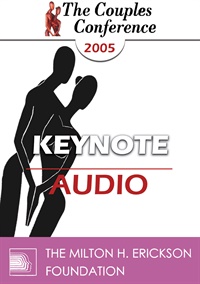
- Average Rating:
- Not yet rated
- Topic Areas:
- Keynotes | Couples Therapy | Neurobiology | Love | Addiction | Depression
- Categories:
- Couples Conference | Couples Conference 2005
- Faculty:
- Helen E. Fisher, PhD
- Duration:
- 1:02:24
- Format:
- Audio Only
- Original Program Date:
- Mar 05, 2005
- Short Description:
- Anthropologist Helen Fisher discusses the brain networks associated with romantic love to explain frustration, attraction, abandonment, rage, the despair response, love, addiction, stalking, love, suicide, and other phenomena associated with romantic rejection. She concludes that long term use of serotonin-enhancing antidepressants can jeopardize romantic love and attachment to a mate.
- Price:
- $15.00 - Base Price
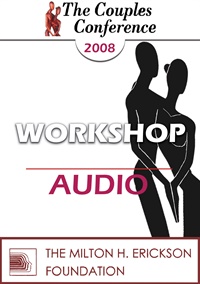
- Average Rating:
- Not yet rated
- Topic Areas:
- Workshops | Addiction | Attachment | Couples Therapy | Personality Disorders | Avoidant | Psychobiological Approach to Couples Therapy (PACT)
- Categories:
- Couples Conference | Couples Conference 2008 | Pioneers in Couples and Family Therapy
- Faculty:
- Stan Tatkin, PsyD, MFT
- Duration:
- 2:24:28
- Format:
- Audio Only
- Original Program Date:
- Apr 27, 2008
- Short Description:
- Avoidant attachment can resemble disorders of the self, such as narcissistic or schizoid presentations, where partners rely heavily on auto-regulation and disengage from mutual emotional attunement. This workshop examines how such dynamics play out in romantic relationships, offering practical strategies—like proximity-based interventions and structured dyadic exercises—to support co-regulation and foster secure relating.
- Price:
- $15.00 - Base Price
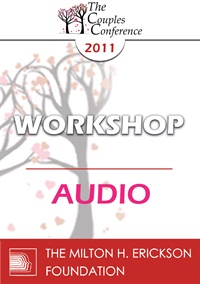
- Average Rating:
- Not yet rated
- Topic Areas:
- Workshops | Panic | Addiction | Pain and Healing | Sex and Sexuality | Couples Therapy
- Categories:
- Couples Conference | Couples Conference 2011
- Faculty:
- Marty Klein, PhD
- Duration:
- 1:56:37
- Format:
- Audio Only
- Original Program Date:
- Apr 01, 2011
- Short Description:
- This talk presents: 1) current information about porn, its users, and its impact on consumers and their relationships; 2) the common model of how porn use shapes sexual decision-making, and an alternative model that better matches people’s experiences; 3) an alternative to the “porn addiction” model for diagnosing and treating compulsive or impulsive behavior regarding porn.
- Price:
- $15.00 - Base Price
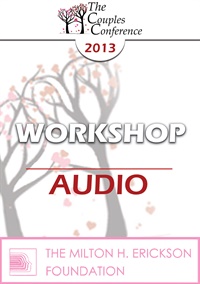
- Average Rating:
- Not yet rated
- Topic Areas:
- Attachment | Trauma | Addiction | Family Therapy | Workshops | Couples Therapy
- Categories:
- Couples Conference | Couples Conference 2013
- Faculty:
- Stephanie Brown, PhD
- Duration:
- 2:00:59
- Format:
- Audio Only
- Original Program Date:
- Apr 19, 2013
- Short Description:
- CC13 Workshop 02 - When Society Loses Control: Attachment, Trauma, and a Developmental Process of Couple and Family Addiction and Recovery - Stephanie Brown, PHD What is the process of “normal” couple and family recovery in the context of cultural loss of control? We will define addiction as a traumatic disorder of attachment for individuals and the family. We will review the Family Recovery Research Project, with an emphasis on the couple, outlining the stages of active addiction and recovery and the key themes and tasks of development that arise, along with the implications for couples therapy at every stage when the culture remains chronically stressed, chaotic and FAST.
- Price:
- $15.00 - Base Price
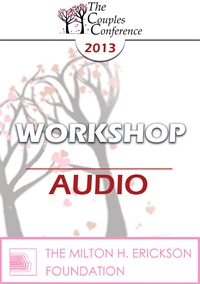
- Average Rating:
- Not yet rated
- Topic Areas:
- Addiction | Workshops | Couples Therapy | Family Therapy
- Categories:
- Couples Conference | Couples Conference 2013
- Faculty:
- Stephanie Brown, PhD
- Duration:
- 2:01:01
- Format:
- Audio Only
- Original Program Date:
- Apr 21, 2013
- Short Description:
- Society has lost control. Many in the culture are living in a downward spiral of a new addiction, chasing money, power, success and a wilder, faster pace of life. What is the impact on our understanding and treatment of the addicted couple and family who must live and work in a culture that is out of control? Dr. Stephanie Brown will present her new work on American culture’s addiction to FAST, and outline how all couples therapy must now include an understanding of addiction.
- Price:
- $15.00 - Base Price



